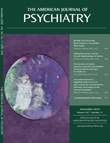Linking Molecules to Mood: New Insight Into the Biology of Depression
Abstract
Major depressive disorder is a heritable psychiatric syndrome that appears to be associated with subtle cellular and molecular alterations in a complex neural network. The affected brain regions display dynamic neuroplastic adaptations to endocrine and immunologic stimuli arising from within and outside the CNS. Depression's clinical and etiological heterogeneity adds a third level of complexity, implicating different pathophysiological mechanisms in different patients with the same DSM diagnosis. Current pharmacological antidepressant treatments improve depressive symptoms through complex mechanisms that are themselves incompletely understood. This review summarizes the current knowledge of the neurobiology of depression by combining insights from human clinical studies and molecular explanations from animal models. The authors provide recommendations for future research, with a focus on translating today's discoveries into improved diagnostic tests and treatments.



